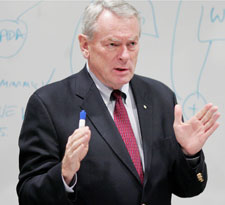Pro sports turn blind eye to drugs anti-doping czar charges

Dick Pound, Chairman of the World Anti-Doping Agency, was the keynote speaker at this year’s Rogers Sportsnet Sports Journalism Workshop.
Photo by Andrew dobrowolskyj
Dick Pound is billed as a man who is not afraid to stir up controversy, and on Nov. 19 he lived up to his reputation.
The chairman of the World Anti-Doping Agency was the keynote speaker at the Rogers Sportsnet Workshop in Sports Journalism and Broadcasting, at Concordia’s new Communication Studies and Journalism Building.
Pound offered a stinging rebuke to North America’s professional sports, particularly major league baseball.
“If you have an IQ of more than room temperature, you know there’s a problem in baseball,” he said.
Pound said the penalties handed out by the league’s commissioner to players caught using steroids are absurdly mild.
“The first time they get caught cheating, they get counselling. The second time, they get fined. The third time, they get a ten-game suspension.” It’s not until the fifth time a player is caught that he gets “maybe a one-year suspension.”
He did commend the league for taking steps in recent weeks to toughen up the policy. “Major league baseball is finally being dragged to the table of realism,” he said.
Pound also believes the National Hockey League has a long way to go before it can every claim to be a drug-free league. The NHL’s attitude is “Thank God we don’t need to test our hockey players, because there’s no doping problem.”
Some organizations use bully tactics to dissuade journalists from writing critical stories about athletes who use drugs, according to Pound. After a critical article is published, “access is gone. They cut you off.”
“If you have an IQ of more than room temperature, you know there’s a problem in baseball”
Pound is chancellor of McGill University, and also spoke about the hazing scandal, sparked by a rookie football player’s complaint of being threatened by other players with anal penetration with a broomstick during an initiation ritual. McGill responded by cancelling the last two games of the football season, a move that was seen as inadequate by some observers.
Pound called the hazing incident unacceptable, but added that the university acted very quickly within a prescribed set of rules. “Most people I’ve spoken with think we’ve done the right thing,” he said.
However, he said the victim leaked information about the case to journalists, but did not cooperate with the university’s investigators, and suggested that some of the responsibility for this could be laid at the hands of the victim’s parents.
“If this happened to your son or daughter, how much of it would you like to see in the media?” he asked.
Other panellists and speakers at the workshop were Olympic gold medalist Myriam Bédard, Bill Marsden, Jack Todd and Phil Carpenter, both of The Gazette, Rob Faulds and Scott Morrison of Rogers Sportsnet, Mike Farber of Sports Illustrated, Mary McDonald, president of the North American Society for Sociology of Sport, Greg Malszecki of York University and Mark Lowes of the University of Ottawa.
Jay Turnbull was awarded this year’s Rogers Sportsnet Scholar-ship in Journalism. Rogers also awarded a scholarship to Communication Studies student Tomoe Yoshihara and a mentorship to Journalism student Dominique Carrier.
The workshop was organized by Linnet Fawcett of Communi-cation Studies and David Yates of Journalism,